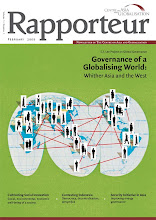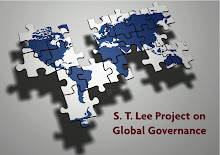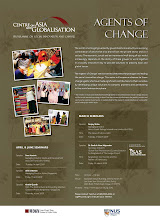The best way to start is at the end.
“Is it perhaps a question of legitimacy and by what criteria are countries judged as eligible to become members of the G8, including those other countries aspiring to be included in this exclusive body?” This was the last question from audience to Masahiro Kuhno, Deputy Foreign Affairs Minister of Japan and “Sherpa” to the G8 summit during a lunchtime seminar series entitled "G8 – All Talk, No Action?"
At the heart of this question is a much-vaunted discomfort over G8’s continued existence amidst a world already besieged by numerous global institutions involved in the precarious responsibility of overseeing the global economy. And whether this task rightfully belongs to a coterie of countries who have no other common denominator except that they are the world biggest economies, and coincidentally, Mr. Kuhno himself charmingly admits, the world’s biggest emitters.
Robert Cox refers to the G8 as a “nebuleuse”, “a process of governance without government, involving a transnational process of consensus formation among the official caretakers of the global economy.” Unlike other global institutions, the G8 has no physical headquarters, no governing charter, no overseeing board. The only concrete manifestation that they exist at all is a collective photograph of all G8 heads of state who converge on the country hosting the annual meeting. And, quite disconcertingly, a digital posting of the elaborate G8 menu sneaked in by some enterprising blogger.
This year’s meeting held in Hokkaido, Japan, seems preoccupied with the issue of expansion and enlargement of membership. Should it include the G-5 (another loose coterie of countries on the rise --- China, India, Brazil, Mexico and Indonesia)? Who and how is that decision going to be made? Should the G-5 be treated as “outreach” activities or should the G-8 seriously deliberate the question of becoming G-13?
Are these are the critical questions that should preoccupy these global leaders? More pointedly, shouldn’t the issue of expansion and enlargement be re-framed in terms of including a wider representation of constituencies beyond those represented by the state? Shouldn’t the substantive issue of declining contributions to ODA raise red flags on these leaders’ commitment to reduce global poverty? [Tess]
Tuesday, August 19, 2008
Subscribe to:
Post Comments (Atom)










No comments:
Post a Comment